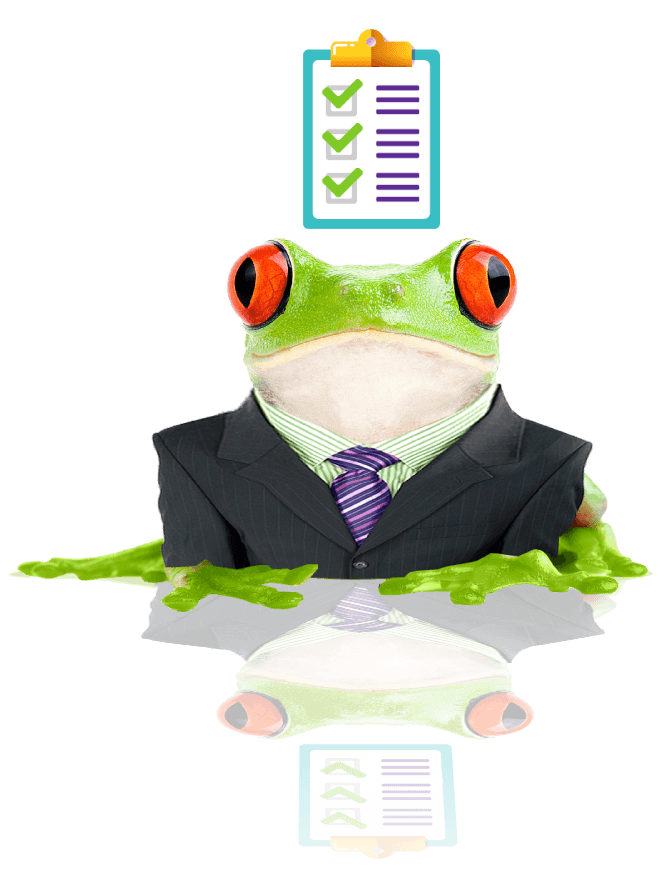Application management.
97% of Leapfrog clients over the past ten years say, “Help Desk cares about fixing my problem as much as I do.”
Focus on your business instead of your apps.
App management can be challenging because even small organizations use an average of 73 apps. With so many apps to manage, it’s easy for your IT team to fall behind and become burdened with a backlog of app-related tasks, especially if you’re simultaneously involved in digital transformation projects.
Effective app management delivers more reliable app uptime and performance with fewer disruptions and risk. You eliminate backlogs and your business is more productive. Employees work faster when apps perform like they’re supposed to, and if they have any questions or issues, Leapfrog’s IT Support Center and fast resolutions are just a click or call away.

Use a systematic approach for efficient, optimized operations.
At Leapfrog, application management is a comprehensive methodology. We document all the apps your organization uses — including what each app is used for, how it works, where it’s located (server or cloud), who uses it, who authorizes privileges, and what’s involved in user onboarding and offboarding. We also identify and document the best practices for maintaining, updating, and troubleshooting each app, and change management processes are equally regimented for ongoing reliability. Sophisticated tools help us streamline everything.
With Leapfrog’s team managing your apps, don’t have to worry about app operations, maintenance, version control, or upgrades.

Manage every app for optimal performance.
Leapfrog app management within the Leapfrog Methodology can cover all your business apps:
Core apps include popular back-office business applications, including Microsoft Office and dozens of other Microsoft products, VMware, Red Hat, Veeam, and standard web browsers among other popular apps.
Leapfrog has established relationships with these vendors, is fully versed on the intricacies, and has a direct line to the vendor for the few instances when we need to escalate resolutions. Our engineers hold professional certifications on these apps, including Windows, OSX, and Linux operating systems.
Since we work with these apps all day every day, it’s unusual for a problem to arise with a core app that we have not dealt with before. What’s more, when we find or learn of a vulnerability in a core app, we proactively apply the fix to your environment. Often, your environment will not have experienced any problem before we’ve applied the fix.
Cloud-based apps are apps that run on someone else’s servers. The most popular way to deliver cloud-based apps is Software as a Service (SaaS). Some companies offer their cloud-based app through remote-access or terminal services. Leapfrog manages both types of cloud-based apps.
Leapfrog works to understand your cloud-based apps and their interdependencies. We document the critical components and set up monitoring so that we have visibility. This visibility ensures you have consistent, reliable access.
If there is a problem with a cloud-based app, we determine where the problem is happening — on your network, with your vendor, or somewhere in between. Following the ITIL process, we work in coordination with your vendor to troubleshoot and inform you when the issue is resolved.
Examples of cloud-based apps we manage most often include Salesforce, Adobe, Workday, QuickBooks Online, SugarCRM, Google Apps, NetSuite, Raiser’s Edge, GoToMeeting, WebEx.
Leapfrog is familiar with dozens of third-party apps, many of which are specialized for specific industries. For our analysts to support a third-party app beyond basic monitoring and troubleshooting, your organization needs to have a support contract with the app vendor. This allows us to work directly with specialists at the app support center if you experience an issue that needs escalating.
If your organization uses apps that are new to us, our team will learn the apps to ensure installation, integration, performance, patches, and updates are all functioning properly. If no documentation is available about how to manage a critical app, we’ll write it for you, including the escalation path. That way, even the toughest issues can be handled quickly and effectively.
Examples of third-party apps include Ceridian, Cognos, Blackbaud, and Epicor.
Proprietary apps have been either developed internally or specifically for your company. We manage these apps in a similar manner as third-party apps except that the escalation path is to either an internal resource at your company or a consultant familiar with the app that has been contracted with. In the vast majority of cases, Leapfrog is able to resolve the issue by relying on our experience or the documentation we have built.
If you want your internal IT team to co-manage your internal apps, you can use Leapfrog expertise to share app management responsibilities in ways that best support your team.
While each client is different, Leapfrog will typically designate a Leapfrog analyst to be your subject matter expert (SME) for issues related to your proprietary apps. This analyst will first triage any problem to confirm it’s not related to configuration or set-up. If it’s not and if the problem or fix is undocumented, we escalate it to your internal team and work with them to resolve the issue.
Legacy apps are applications that vendors no longer support. You may be using legacy apps that are still important to running your business.
For Leapfrog legacy app support, it’s important to identify an individual who has familiarity with your application. If using our experience and the documentation we created does allow us to resolve an issue, we contact your designated resource on your behalf. While Leapfrog strongly recommends that all companies use currently supported apps, we realize using legacy apps can be a business necessity and we work with you to accommodate your needs.